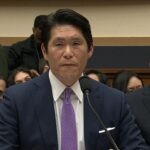
Published June 28, 2023
Florida Gov. Ron DeSantis’ rollout of his presidential campaign may be kicking into a new gear with the launch of his immigration platform this week.
For DeSantis to succeed in winning the nomination, he needs to attract both Republicans who have some hesitations about former President Donald Trump and some who supported him but would prefer a candidate with less baggage.
The topic of immigration shows how hard it can be to outflank Trump — but also why a successful challenge may require drawing some sharper contrasts. The DeSantis plan, rolled out at a press conference at the Texas border Monday, lays out steps that should satisfy most Republican border hawks. But DeSantis’ future policy rollouts will need to find ways of distinguishing his approach from that of the former president in ways that appeal to Republican primary voters.
DeSantis’ calling card is his willingness to dive into the wonky details of policymaking. Even in his infamously glitchy campaign announcement on Twitter, as well as in fireside chat-style events in key primary states like Iowa and South Carolina, the Florida governor demonstrates a depth of policy knowledge that has helped him make the Sunshine State a leader on conservative priorities such as school choice, gun rights, abortion and economic growth.
His immigration plan showcases a candidate interested in effective policymaking beyond pure sloganeering, even if some major questions surround a few key details. But the plan also highlights the governor’s difficulty here: selling voters on being sufficiently different from Trump while also seeking to fulfill the former President’s political vision.
Many of the highlights of the DeSantis immigration plan will sound familiar to those who remember the Trump administration’s efforts to add border patrol agents, establish the “Remain in Mexico” policy, and, of course, build a wall on the southern border. The former President noted the similarities — “His plan is my plan,” Trump told Semafor and ABC News on Tuesday. “I mean, he’s basically copied everything I said.”
There’s a reason DeSantis’ immigration plan hits familiar notes — it’s hard to be any more hard-line than the man whose 2016 primary success was, in large part, fueled by a Republican base eager for bold rhetoric and action on immigration. In office, his administration’s handling of the issue was popular among the base, with 9 in 10 Republicans supporting the President’s handling of the issue in 2018, according to a PBS Newshour-NPR-Marist poll.
DeSantis’ pitch to primary voters is, mainly, that he will bring a new focus to finish the job Trump started. Under the hood, his plan offers some ideas that are eminently sensible, and some that are, to put it generously, a stretch.
On the plus side, reinstituting the “remain in Mexico” policy and tightening up enforcement of existing laws are both no-brainers for any conservative candidate, and trying to improve the asylum system is a worthwhile effort. While sending troops across the southern border to combat drug cartels would likely worsen relations with Mexico, his plan signals a serious focus on trying to stop the scourge of fentanyl trafficking.
Then, there are the ideas in DeSantis’ plan that have a harder time standing up to scrutiny. The Trump administration talked seriously about using an executive order to end birthright citizenship — the fact that any child born on US soil is automatically a citizen — but did not succeed. While the idea has repeatedly been pushed by conservative hard-liners, most legal observers agree it would require a constitutional amendment.
Similarly, cutting federal funding to non-governmental organizations that provide aid to those who cross the southern border would be less effective than it sounds. The groups that provide food and shelter to those who cross the southern border are not, contrary to the claims of some on the House Republican Study Committee Congress, human traffickers. If a DeSantis administration encouraged Congress to cut those grants, southern border towns or other federal agencies would feel even more of a strain.
On immigration, Republican voters want to know their nominee is taking the issue seriously, and adopting an approach that pledges to finish the job Trump started will likely cover that base. But that same approach won’t be enough when it comes to the other policy details DeSantis is expected to roll out over the next few weeks.
On economics, for example, DeSantis will have to speak in policy terms the average voter will understand, particularly those looking for answers on what the governor of a successful Sun Belt state can promise to Rust Belt states that feel economically left behind.
Trump’s success — speaking about “American carnage” and the need to boost American manufacturing — was one way of speaking to those concerns. DeSantis will need to parry with his own vision for what a successful economic agenda should look like and how his administration would prioritize working-class families beyond the usual Republican agenda of tax cuts.
Championing place-based policy, such as prioritizing economic development in distressed communities as proposed by the center-right Economic Innovation Group, or pro-family policy like that proposed by the conservative think tank American Compass, could give the DeSantis campaign a noteworthy distinctiveness.
DeSantis’ bid for the Republican nomination may not rise or fall on the specifics of these policy platforms. Voters want to know a politician has answers for the problems burdening them, but politics isn’t just a battle of white papers. To generate momentum, DeSantis will need to turn his policy-minded tendencies into both an attack on Trump’s ability to get things done, as well as an explanation of what his approach would offer that the former President’s doesn’t.
After all, his carefully executed entrance into the race has been swamped by Trump’s ongoing spotlight-hogging court battles and unceasing attacks online. Making sure voters can tell the difference between their visions for the country — in addition to their ability to bring them to fruition — might be one way of heightening the contrasts by the time the first debates roll around.
Patrick T. Brown is a fellow at the Ethics and Public Policy Center, where his work with the Life and Family Initiative focuses on developing a robust pro-family economic agenda and supporting families as the cornerstone of a healthy and flourishing society.












